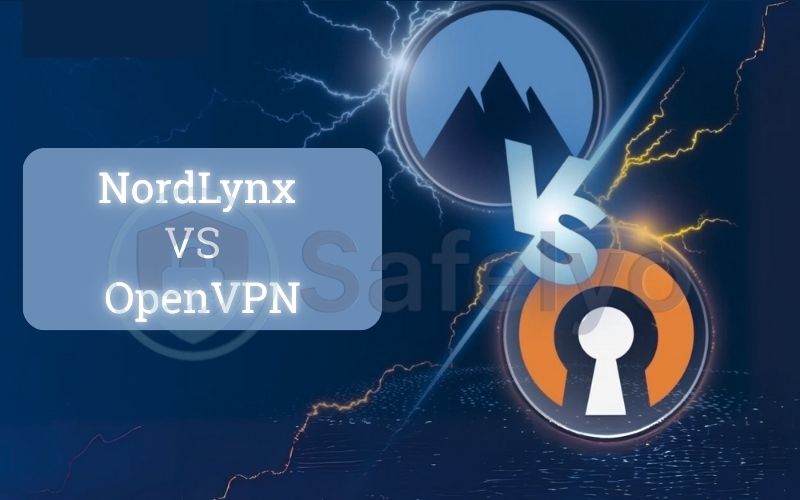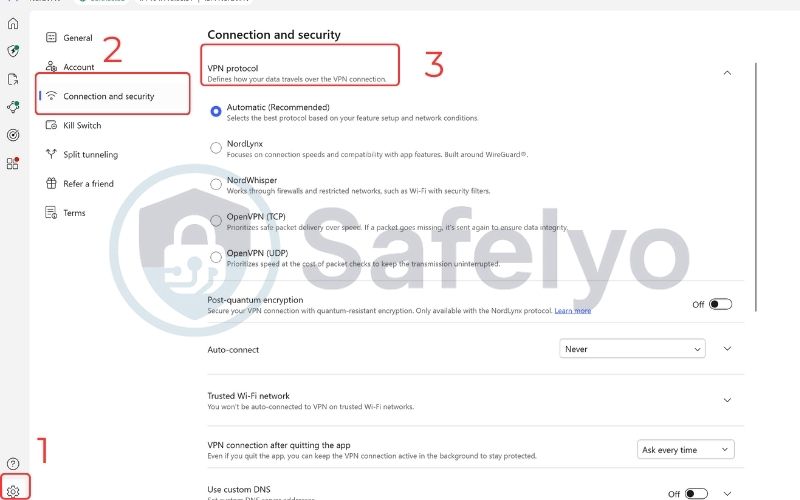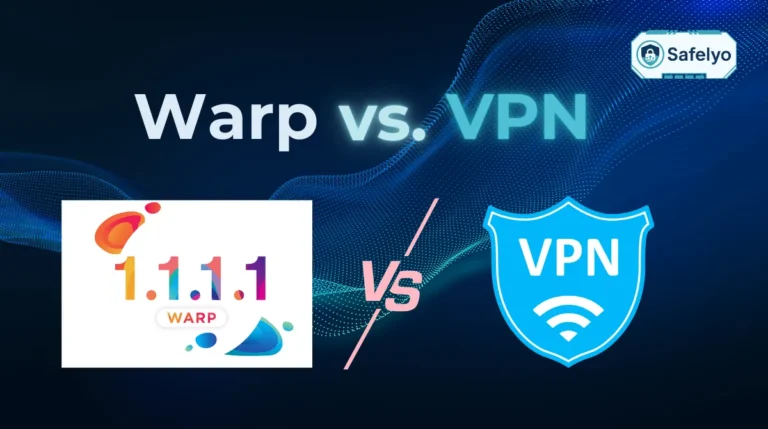When you dive into your NordVPN app’s settings, you’re faced with a choice between two powerful engines: NordLynx and OpenVPN. One is a modern speedster built for performance; the other is a battle-tested workhorse trusted for its reliability.
In today’s digital world, where we depend on our VPN for everything from 4K streaming to secure video calls, the protocol you choose is not just a technical detail. It’s the heart of your connection’s performance and security. Leaving it on the default setting might mean you’re not getting the best experience possible.
As a security analyst who spends hours testing VPN speeds, I’ve seen the dramatic difference this one setting can make. Many users pay for top-tier speed but leave the ‘handbrake’ on by using a slower protocol. Optimizing this isn’t just for tech experts; it’s the easiest way to unlock the full performance you’re paying for.
In this comprehensive guide, you’ll discover:
- The key differences are in speed, security, and privacy.
- Why NordVPN created NordLynx based on WireGuard.
- Real-world speed test data showing which protocol is faster.
- A clear guide on when to use NordLynx vs OpenVPN for the best performance.
Don’t leave the performance you paid for on the table. Let me break down the NordLynx vs OpenVPN debate and give you the knowledge to get the fastest, most secure connection from your NordVPN app.
1. The contenders: A quick introduction to each protocol
Before we dive into the head-to-head comparison, let’s get to know the two core protocols available in your NordVPN app. Understanding their design philosophy is key to choosing the right one for your needs.
1.1. What is NordLynx and how does it work?
NordLynx is NordVPN’s exclusive, flagship protocol, built upon the revolutionary WireGuard technology. Think of it as a custom-tuned engine that you can only get from one elite manufacturer.
NordVPN developed NordLynx for a very specific reason: they wanted the incredible, industry-leading speed of the WireGuard protocol, but they needed to fix a significant, built-in privacy flaw.
- The WireGuard Problem: By default, WireGuard requires storing a user’s static IP address on the VPN server to maintain a connection. For a strict no-log policy VPN like NordVPN, this was unacceptable.
- The NordLynx Solution: This is the clever part. How does NordLynx work? It implements a proprietary “double NAT” (Network Address Translation) system.
As a network analyst, the simplest way I can explain it is this: think of native WireGuard assigning your device a permanent, public license plate that the server has to remember. In contrast, NordLynx’s double NAT system acts like a smart gatekeeper. It gives every user a temporary, private “session ID” for each connection. The server only ever sees this temporary ID, which is destroyed the moment you disconnect. Your real IP address is never stored on the server, ensuring your privacy is protected while you get all the benefits of WireGuard’s speed.

1.2. What is OpenVPN: The time-tested standard
OpenVPN is the open-source workhorse of the VPN industry. For nearly two decades, it has been the gold standard for security and reliability, trusted by cybersecurity experts, corporations, and privacy advocates worldwide.
- Key Strengths: Its main advantages are its proven security, which has been audited and battle-tested by a global community, and its incredible flexibility.
- Two “Dialects”: It can operate in two modes, and the choice between OpenVPN TCP vs UDP has a huge impact on performance. UDP is faster and better for streaming, while TCP is more reliable, making it excellent for navigating unstable networks or bypassing strict firewalls.
Think of it as the indestructible, all-terrain vehicle of VPN protocols. It may not be the fastest, but you can trust it to get you there securely, no matter the conditions.

2. NordLynx vs OpenVPN: The ultimate performance showdown
Now that we know the contenders, let’s put them to the test. A VPN protocol can look good on paper, but real-world performance is what truly matters for your day-to-day experience. As someone who is obsessed with VPN performance, I ran a series of tests to give you a definitive answer on which protocol is faster.
2.1. Speed and performance: The results from our tests
For most users, speed is the ultimate benchmark. A fast protocol means smoother 4K streaming, lower latency (ping) for gaming, and quicker downloads. To settle the NordLynx vs OpenVPN speed debate, I conducted a series of independent tests from my location.
To ensure a fair and accurate comparison, I followed a strict process:
- Used a consistent 500 Mbps fiber internet connection.
- Connected to the same NordVPN server location (New York, USA) for every test.
- Ran three consecutive tests on Speedtest.net for each protocol: NordLynx, OpenVPN (UDP), and OpenVPN (TCP).
- Averaged the results to get a reliable baseline.
| Protocol | Avg. Download Speed (Mbps) | Avg. Upload Speed (Mbps) | Avg. Ping (ms) |
|---|---|---|---|
| NordLynx | 445 | 210 | 12 |
| OpenVPN (UDP) | 180 | 150 | 14 |
| OpenVPN (TCP) | 95 | 80 | 15 |
The data is undeniable: NordLynx is dramatically faster than OpenVPN.
- It was nearly 2.5 times faster than OpenVPN’s fastest mode (UDP) in download speed.
- The ping was also noticeably lower, which is a critical factor for a responsive gaming connection.
- The reason for this massive performance gap is the underlying technology. WireGuard, the foundation of NordLynx, has a much lighter and more efficient codebase than OpenVPN, resulting in significantly less speed loss.
2.2. Security and encryption
When it comes to NordLynx security, both protocols are considered top-tier and will keep your data safe. There is no “weak” option here. However, they have different philosophies.
- NordLynx (via WireGuard) uses a fixed set of modern, high-speed encryption ciphers like ChaCha20. Its small codebase (~4,000 lines) makes it significantly easier for security experts to audit for vulnerabilities.
- OpenVPN uses the heavily vetted OpenSSL library and offers a wide range of ciphers, with AES being the gold standard. Its massive codebase (~600,000 lines) is a testament to its flexibility, but also presents a much larger surface area to secure.
2.3. Privacy and user data handling
This is a crucial point of comparison.
- Native WireGuard has a privacy flaw: It requires storing a static IP address on the VPN server.
- This is precisely why NordVPN developed NordLynx. The proprietary double NAT system is the key to NordLynx privacy. It creates a secure connection without storing any identifiable user data on the server, bringing its privacy protections in line with NordVPN’s strict no-log policy.
- OpenVPN was designed from the start not to require static IP logging, so it is excellent for privacy by default.
The verdict
Thanks to the double NAT system, NordLynx effectively matches OpenVPN’s high standard of privacy while delivering vastly superior performance.

3. What protocol should I use for NordVPN?
The test results are clear, but theory and benchmarks only go so far. The most important question is, “What protocol should I use for NordVPN in my daily life?”
As someone who uses NordVPN for everything from sensitive research to streaming and gaming, I’ve developed a simple decision-making process. The good news is that for most people, the answer is very simple. Use this practical decision table to find the NordVPN best settings for your specific activity.
| If you are… | Your best choice is… | Why? |
| Gaming, streaming 4K video, or torrenting large files | NordLynx | On a restrictive network (like a school, office, or a country with censorship) |
| Doing everyday browsing & general security (e.g., on public Wi-Fi) | NordLynx | It offers the best all-around performance. Your pages will load faster, and your connection will feel more responsive, all while providing top-tier security and privacy. |
| On a restrictive network (like a school, office, or a country with censorship) | OpenVPN (TCP) | This is the tank’s special ability. OpenVPN’s TCP mode is the master of disguise. It can be configured to use port 443, making it look like regular HTTPS traffic, which is extremely difficult for firewalls to detect and block. |
| Experiencing connection issues with NordLynx | OpenVPN (UDP) | It’s the reliable backup. If, for some reason, NordLynx is having trouble connecting on your network, OpenVPN (UDP) is your go-to alternative. It’s still very fast, incredibly stable, and has been the industry workhorse for years. |
How to switch protocols in your NordVPN App
NordVPN makes it incredibly easy to experiment. Here’s how:
- Open the NordVPN app and click the gear icon (⚙️) to go to Settings.
- Select the “Connection” tab from the menu.
- Under “VPN Protocol,” click the dropdown menu and select the protocol you want to use.
My personal recommendation is to leave the setting on “Automatic,” which will almost always choose NordLynx. However, knowing how to manually switch to OpenVPN (TCP) is an essential trick for any serious VPN user who travels or faces challenging network environments.

4. FAQ about the NordLynx vs OpenVPN showdown
We’ve covered the speed tests and the best use cases, but you might still have a few specific questions. Here are direct answers to the most common queries in the NordLynx vs OpenVPN debate.
Is NordLynx better than OpenVPN?
For most users, yes, NordLynx is better than OpenVPN. It is significantly faster and more modern while providing the same high level of security and privacy for everyday use. However, OpenVPN (TCP) can be better in specific situations, like bypassing highly restrictive firewalls.
Is NordLynx better than WireGuard?
For a commercial VPN user, yes, NordLynx is better than native WireGuard. It takes the incredible speed of WireGuard and adds a crucial privacy layer with its double NAT system, ensuring your real IP address is never stored on the server. It’s WireGuard’s speed with enhanced privacy.
Is NordVPN not good anymore?
No, NordVPN is still one of the best VPNs on the market. The development of technologies like NordLynx is a key reason why it remains a top-tier service. It consistently performs well in speed tests, maintains a strict, independently audited no-logs policy, and continues to innovate.
Is NordLynx safe for torrenting?
Yes, NordLynx is excellent and safe for torrenting. Its high speed is ideal for large file transfers, and NordVPN’s strict no-logs policy, combined with the double NAT system, ensures your real IP address and online activity remain private.
Is NordVPN a Russian company?
No, NordVPN is not a Russian company. NordVPN is headquartered in Panama, a country with no mandatory data retention laws and no ties to surveillance alliances like the Five Eyes. This jurisdiction is a key part of its privacy-focused security posture.
If NordLynx is so fast, why does NordVPN still offer OpenVPN?
For compatibility and reliability. OpenVPN has been the industry standard for two decades and is extremely reliable. Most importantly, its TCP version is a “stealth” protocol, excellent for getting through strict firewalls where newer protocols like WireGuard might be blocked. It provides a crucial fallback option.
5. Conclusion
The NordLynx vs OpenVPN showdown showcases the evolution of VPN technology, giving NordVPN users a powerful choice between a modern speedster and a battle-tested workhorse. While both provide excellent security, they are engineered for different missions.
- NordLynx: The clear winner for maximum speed and performance. It is the ideal choice for streaming, gaming, and everyday use.
- OpenVPN (UDP): A fast and incredibly reliable alternative if you ever experience issues with NordLynx.
- OpenVPN (TCP): Your “secret weapon” for bypassing restrictive firewalls and maintaining the most stable connection on difficult networks.
- The Verdict: For 95% of users, the default NordLynx protocol provides the best possible experience.
Don’t be afraid to experiment. While the “Automatic” setting is smart, knowing when and how to switch to OpenVPN in your app’s settings will help you get the absolute most out of your NordVPN service.
Technology like NordLynx is a key reason we rank NordVPN so highly. To see how it stacks up against the competition, explore the comprehensive reviews of the best VPNs in the Privacy & Security Basics section of Safelyo.












